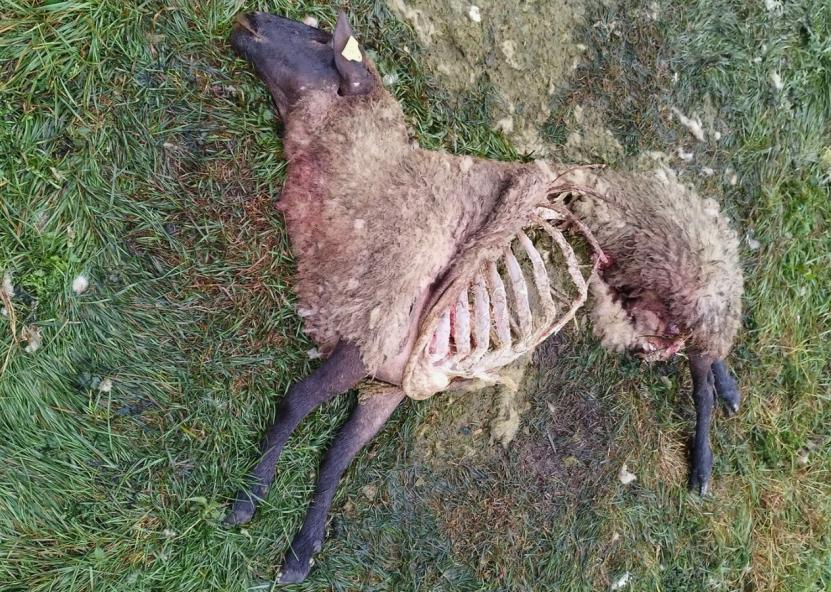As wolves cut down sheep herds, more hunting and reforestation are proposed
Lithuanian sheep farmers are no longer coping with wolves cutting down their animals. Too much deforestation in Lithuania, they say, has left the herbivores foraging in farm fields, while wolves prefer to hunt the slower-running fenced-in sheep.
Breeders say wolves are not only hurting their businesses financially, but also emotionally, and sheep farms are shrinking. They say action is needed to save farms – reforestation, reducing wolf populations.
„The wolf is supposed to live in the forest and sheep are supposed to live in pastures and meadows, but this is a law of our nature gone wrong. One thing – forestry farms, those indiscriminate deforestations, are really driving the wolves out of the forests, because neither deer nor roe deer live in the forests any more. The other thing is that farmers sow a lot of winter things – it's oilseed rape, cereals, wheat, so most of those herbaceous beasts are gathering in the shelters. (...) So why chase a roe deer, which runs fast, if you can chase a sheep," Rimantas Kairys, chairman of the council of the Association of Lithuanian Sheep Breeders, told BNS.
„It's common for all of us to see roe deer running across the road in the fields, but this year was the first time I have seen a wolf running across the road“, added Vytautas Dzingulevičius, head of the cooperative „Avininkas“ in the Moletai district which brings together dozens of sheep farmers.
R. According to Kairis, the number of sheep in Lithuania has dropped by almost 13% in five years.
Because of the difficulties, sheep breeders are choosing not to develop their business anymore.
„If five years ago we had roughly 168,000 sheep in Lithuania, now we have about 145,000,“, – he said.
Sheep farmers' representatives said that neither fences nor barns help in the fight against wolves, as they find ways to circumvent these protections.
„The wolf – is a smart animal. It digs under that fence and even gets into barns. If the number of sheep slaughtered per year (BNS), which is registered, is about 1.8 thousand, 200 calves, that is a big number," Kairys said.
„Buildings are not the solution, in the Lazdijai district in spring or early summer a wolf broke into a barn and worked there. (...) This (building fences – BNS) doesn't help, because there is simply too large a population of wolves“, – added V. Dzingulevičius.
R. According to Kairis, lone wolves are the most problematic.„The biggest losses are caused by lone wolves, because it does not live in a herd, it is more difficult to find food and a lone wolf can travel up to 50 kilometres a day. (...) Even if the conditions were right to remove (shoot – BNS) that wolf... But he can hunt only from 15 October," he said.
V. Dzingulevičius said that the state pays payments for slaughtered sheep, but sheep farmers lose customers this way.
„You have a clientele, let's say, and you get slaughtered for that year. Lambs, lambs that would be sold for meat. And your customers disappear, they find somewhere else to buy because you have nothing to offer them that year," Dzingulevičius said.
In addition, according to the speakers, wolf attacks are difficult to bear emotionally.
„It really affects a person when you come to a flock and see 20 sheep lying down, some still moving, others already dead, with their necks cut open, their bellies ripped open, their intestines thrown out. Emotionally, maybe it is much more costly than financially. (...) After such an attack, you think about it for three days," Dzingulevičius said.
R. Kairys stressed that the problem could be solved in various ways: by increasing the limit of wolves allowed to hunt, by reforestation, by facilitating the process of removing lone wolves, which is currently very bureaucratic.
„Wolf hunting is only available from 15 October and we have been making moves to bring this forward. The reasoning is that wolf cubs are not yet trained to live on their own, and if you shoot a wolf, there will be more problems because there will be more lone wolves. (...) We have also proposed to the ministry: to increase the limit, to simplify the removal of lone wolves from the wild, which are terrorizing sheep flocks, (...) then the wolves would be solved," – said a representative of the Lithuanian Sheep Breeders Association.
„One of the options is to do less deforestation, then again, there is a lot of public land, they could just reforest instead of renting that land. They could use that for reforestation. Another thing is to regulate the wolf population," Dzingulevičius said.
R. According to Kairis, tackling the wolf problem would also bring monetary benefits to the state.
„We have been raising this question for several years now – isn't the state so rich that it can afford to pay around 300,000 euros every year for the damage caused by wolves“, – said R. Kairys.










































































































